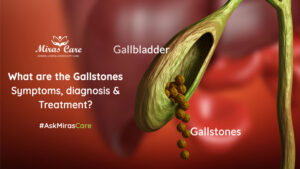According to Dr Mir, A renowned general and laparoscopic surgeon in India, says Gallstone disease, also known as cholelithiasis, is a common medical conditions in the pancreatobiliary system which solid particles or stones accumulate within the gallbladder or bile ducts. These stones can vary in size and content, causing a variety of symptoms and consequences.
Some Certain parts of the world have a higher prevalence of gallbladder stones than other areas. Even if you can consider it, gallbladder and biliary disease cases grew drastically from 26.35 million (95% UI: 22.79–30.60) in 1990 to 52.00 million (95% UI: 44.20–61.21) in 2019 (EAPC = 2.70 [95% CI: 2.58–2.81]). In India, it is estimated to be around 4%, while in the West, it is 10%.
The global burden of gallstone disease has been increasing over the years, and several factors contribute to this growing problem. Here are some key points to consider:
1. Prevalence:
Gallstone disease is one of the most common gastrointestinal illnesses in the world. It affects people of all ages and ethnicities, but it is more prevalent in women and persons over the age of 40.
2. Risk Factors:
On our website, we have already described how gallstones are caused by a variety of risk factors, including heredity, obesity, a high-fat diet, fast weight reduction, certain medical conditions (such as diabetes), and certain drugs. Obesity and metabolic syndrome are becoming more common in many nations, leading to an increased burden of gallstone disease.
Learn more about gall stone risk factor visit : https://www.mirascare.com/gallbladder-stone-treatment
3. Changing Diets:
High-fat, low-fiber diets have been linked to an increased risk of gallstone development. Gallstones are becoming increasingly common in various regions of the world as Western-style diets become more popular.
4. Obesity Epidemic:
The global obesity epidemic has a considerable impact on gallstone disease prevalence. Obesity can cause alterations in cholesterol metabolism and increased cholesterol release into bile, which can encourage gallstone development.
5. Healthcare Access:
Improved healthcare access and diagnostic capabilities have resulted in greater detection and reporting of gallstone disease patients in some locations. This, in turn, contributes to a larger recorded illness burden.
6. Complications:
Gallstones can induce acute cholecystitis, biliary colic, pancreatitis, and obstructive jaundice, among other consequences. These problems may necessitate hospitalization and surgical procedures, increasing the healthcare burden.
7. Aging Population:
The global population is aging, and gallstone disease is increasingly common in the elderly. Gallstone disease is projected to become more prevalent as the world’s population ages.
8. Emerging Economies:
Rapid economic development in emerging economies has resulted in lifestyle and dietary changes that may raise the risk of gallstone formation. Higher prevalence of gallstone disease have been linked to urbanization and a shift away from traditional diets and toward more Westernized ones.
9. Treatment Options :
Gallstone treatment may include sophisticated surgical removal of the gallbladder (cholecystectomy) techniques such as SILS Techniques or any other nonsurgical approaches such as medicines to dissolve stones. The treatment chosen is determined on the intensity of the symptoms as well as the patient’s overall health.
Dr. Mir says that after consultation with different types of people for gallstone treatment, it is critical to recognise that gallstone disease is a multifaceted disorder involving a complex interplay of hereditary, environmental, and lifestyle variables. Preventive measures like keeping a healthy weight, eating a well-balanced diet, and increasing physical exercise can help lower the risk of getting gallstones.
Medical and surgical treatments are available to patients suffering with symptomatic gallstones. The increasing global burden of gallstone disease emphasizes the critical relevance of public health measures targeted at preventing and controlling this widespread medical condition.



